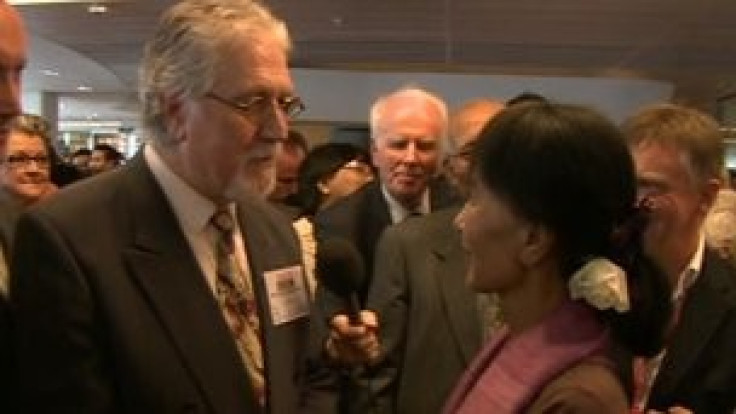Aung San Suu Kyi: A Little More Disdain for Burma Military and a Little Less Love for UK, Please
Aung San Suu Kyi's warm welcome in the UK after years of painful separation was a missed opportunity

Mynamar's hopes for a transfer from colonialism to a fledgling democracy were plunged into darkness more than half a century ago after the leader of the pro-independence movement, General Aung San - Aung San Suu Kyi's father - was assassinated just months before independence was due to be granted in January 1948.
Civil war erupted almost immediately, leading to a collapse of the then government. That in turn opened the door to violent ethnic conflicts, some of which, such as the Kareni insurgency, are still with us today.
In 1962, Aung San's former colleague, Ne Win, seized control of the government and imposed an iron-fist military rule, characterised by the systematic suppression of ethnic minorities and catastrophic economic policies.
Ne Win steps down
In August 1988 the country faced widespread unrest which culminated in a popular uprising calling for democracy. Ne Win stepped down but was replaced by another line-up of army generals and the uprising was crushed. The ruling junta promised fresh elections.
It is at that time that Aung San Suu Kyi, who had left for India in 1960 where her mother worked as Burmese ambassador to India and Nepal, and later on went to the UK where she studied, lived and worked, returned to her homeland. She formed a political party called the National League for Democracy (NLD) which secured over 80 percent of the vote in the parliamentary elections. The generals ignored the results and put the NLD leader under house arrest.
Military-led propaganda
It was the beginning of a long history of persecution for Aung San's daughter who has spent 15 out of the last 24 years under house arrest.
Despite military-led propaganda against her she has remained popular and became an icon of freedom, part Nelson Mandela, part Mother Teresa.
As a result she has been feted by the great and the good of the British establishment and honoured with the privileges of addressing both houses of parliament at a time when her country, despite promises by President Thein Sein to proceed with reforms, is still struggling with violent sectarian clashes.
Aung San Suu Kyi decried the current surge in violence in her speech: "Hostilities continue between Kachin forces and the state-armed forces in the north. In the west, communal strife has led to the loss of innocent lives and the displacement of tens of thousands of hapless citizens.
"We need to address the problems that lie at the root of conflict. We need to develop a culture of political settlement through negotiation, and to promote the rule of law - that all who live in Burma may enjoy the benefits of both freedom and security."
Fast-degenerating situation in Rakhine
But though she mentioned the violence there was no direct condemnation of what human rights groups have warned is a fast-degenerating situation in Rakhine state. The region is undergoing a surge in violence after three Muslim Rohingyas were accused of raping and killing a Rakhine Buddhist girl. Revenge attacks on Rohingyas by Rakhines have soared, with homes being burnt and women being raped, forcing 90,000 people to flee.
Aung San Suu Kyi's rapid resumé of her country's situation, however, did not attract as much press coverage as her praise of the UK's good human rights records, raucous parliamentary system and love of democracy.
Yet her compliments came within days of Britain's parliament passing legislation to curb the use of human rights laws by alleged foreign criminals. While countries in Europe often like to promote human rights, the political rhetoric used by its leaders to push their policies and public image is often different from the daily reality.
While human rights have been agreed at international level and many have been integrated into national law, they are not always enforced - even in Europe.
Human rights as a propaganda tool
Thomas Hammarberg, Council of Europe commissioner for human rights recently wrote in Human Rights in Europe: No Place for Complacency: "It is particularly unfortunate that attempts are made to hijack or distort the very meaning of these rights. Key concepts and the language of human rights have been politicised and demeaned in political discourse. Some governments belittle or cover up their shortcomings while using human rights as a propaganda tool against other states."
"It also happens that government politicians - and some media - object strongly when shortcomings in their own countries are exposed," he added.
Burma, once known as the "the rice bowl of Asia" is a resource-rich country with large deposits of natural gas, oil, tungsten and gems such as ruby and sapphire, and sanctions were lifted earlier this year to reward its recent wave of political reforms.
President Thein Sein will travel to London for talks with David Cameron, a move Aung San Suu Kyi said would help her country avoid being "shackled by the past".
But if her visit to Britain showed one thing, however, it is that idealising people or governments is the easy option when it comes to escaping the past. The fight for human rights does not stop because of a few warm welcome speeches and photo-op handshakes.
© Copyright IBTimes 2024. All rights reserved.





